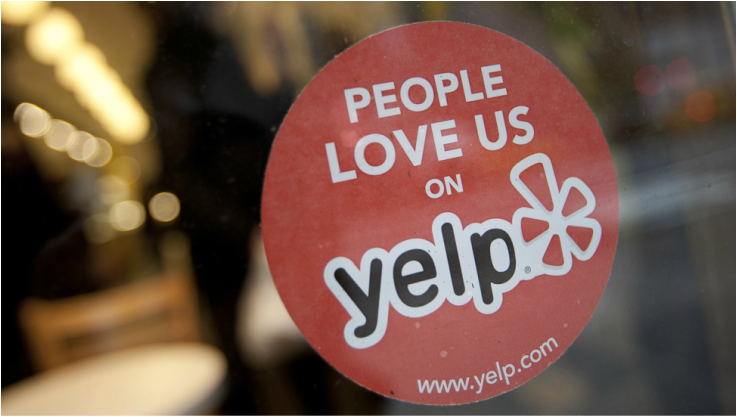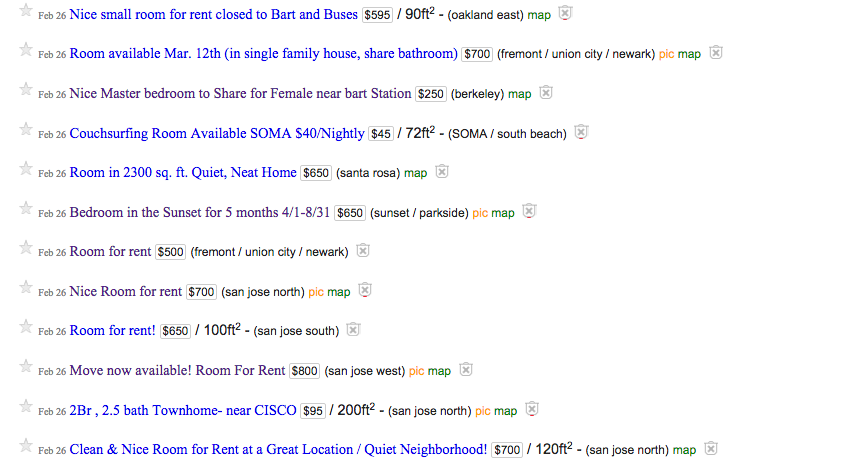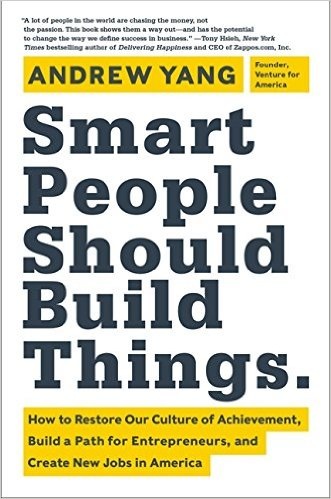|
After hearing it come up for the millionth time today in conversation, I finally read your letter. Plenty of people have rushed to defend you. Plenty more have said some ugly things to and about you.
I'm not here to say you're right or wrong. I know being an adult is super hard -- believe me! I know the Bay Area is extremely, stupidly expensive -- I live here, too, and I'm secretly afraid that someday, I won't be able to afford it anymore. Nevertheless, I'm going to go ahead and commit one of the biggest sins known to man: offering my unsolicited advice. Do what you want with it. I left college, having majored in English literature, with a dream to work in media. It was either that or go to law school. Or become a teacher.
You had to know when you chose to major in English Literature that it was going to be tough to find a well-paying job. I mean, common sense aside... you didn't get the comments? The jokes? You never saw anything like this on Twitter?
Now, don't get me wrong. I completely support your decision to study what you wanted to study. Passion is important.
But it sounds like you didn't have a clear idea of what you wanted to do with this major. Media, law school or teaching? That's not much of a plan. And you never did any internships or took any jobs (other than tutoring) to support your plan. Not that every college undergraduate needs to have a plan. It takes many graduates years to find their path. But if you were my student, I might have asked you, what specifically interests you? What specifically do you want to write about? International relations? Dating? Science? Entertainment? And then I would say, supplement your major with classes that will give you a more solid foundation in those areas. Get volunteer or work experience in those areas. Or I would have told you, you will have a lot more writing opportunities if you understand basic statistics and tech -- especially if you want to live in the Silicon Valley. So supplement your major requirements with some stats or engineering classes. Here's the good news: IT'S NOT TOO LATE! Right now, you can learn about anything you want online, for free. In the course of making yourself a more competitive job candidate, you might discover a new passion. I also desperately needed to leave where I was living — I could get into the details of why, but to sum up: I wanted to die every single day of my life and it took me several years to realize it was because of the environment I was in. So, I picked the next best place: somewhere close to my dad, since we’ve never gotten to have much of a relationship and I like the weather up here.
It sucks that you went through that, and it's great you eventually realized the environment was toxic for you. That said, it sounds like the Bay Area wasn't the "next best place" for you.
1. You weren't close with your dad to begin with, so coming here to try to forge a relationship sounds like an emotionally very risky endeavor. Granted, I don't know anything about the situation. That was just my gut response. 2. You had just accepted what was basically a minimum wage job. Knowing your salary, and knowing the cost of living in the Bay Area, moving here for that job might not have been the best decision. Before moving someplace that's as infamously, outrageously expensive as the Silicon Valley, it would be a good idea to do some budgeting first and think about the quality of living you want. Coming out of college without much more than freelancing and tutoring under my belt, I felt it was fair that I start out working in the customer support section of Yelp/Eat24 before I’d be qualified to transfer to media. Then, after I had moved and got firmly stuck in this apartment with this debt, I was told I’d have to work in support for an entire year before I would be able to move to a different department.
I really like your attitude in the beginning of this paragraph. Yes, without relevant experience, you pretty much have to take what you can get, and there's no shame in that. Get your foot in the door. Make yourself valuable and indispensable! Be an important part of the team!
But what concerns me here is that you found out after you signed the lease and racked up credit card debt that you couldn't get that promotion for at least a year. It sounds like you didn't make your hopes and expectations for this job clear during the interview stages. You might have asked a question like: "What is the typical career trajectory for someone who starts in this position?" "Are there opportunities for advancement within the company from this role? Ultimately, I would love to work in a social media/community management/whatever role." "One of the things that excited me about this position is that I will gain an intimate knowledge of how our customers use the product. I am willing to put in the grunt work, because I think it would help me excel in a marketing/editing role. Do you have an approximate timeline for that?" Asking questions like this will help you in the future, because: 1. You will never again take a job that doesn't have the opportunities for advancement on the timeline you're hoping for. You'll know exactly what you're getting yourself into. 2. It lets your manager know your hopes and expectations for the job. Sure, there is a chance that if they know you're taking this job because you want a different job at the company, they won't hire you. But even in that case, you'll save yourself a lot of trouble by not working there. I was hired the same day as my interview, in fact.
To me, this sounds a little weird. It would have been a red flag to me. Either I rocked the interview SO hard that the hiring manager just knew he/she HAD to have me...
Or this is a job with a lot of employee turnover. They're hiring a lot of entry-level people all the time, because it's hard to keep the workers. And it's probably not that good of a job. It also means that you have no additional rounds of interviews, and therefore, no opportunities to learn about the team, culture, management style, etc. at this company. How can you feel so sure you want to work for a company you've spent an hour interviewing at? How can you feel so sure it makes sense to move across the country and take on credit card debt and a $1,245/month apartment after a single interview? Moving forward, I highly recommend you spend more time researching the company. Come prepared with a list of questions about the job, the team, the company, the opportunities for advancement, mentorship, career development opportunities, and anything else that's important to you. On that note -- I'm sure you already know this, but when you were hired, did you negotiate for a higher salary? Because based on some of the other stuff in your letter, I'm guessing you just took the salary they offered. That's bad -- for so many reasons! First, it would have meant you'd be making either a lot or a little more money that you did. My first job out of school, I asked for a higher salary than they offered. Basically, I told them, "I did some research for the range of salaries for people with my experience in this sort of position, and I was expecting an offer closer to X than Y." I don't remember the exact numbers, but I ended up making about $11,000 more per year than they'd originally offered. Which is: 1. Enough to afford all of the things you wrote about in your letter -- $20 co-pays on doctor visits, food other than rice, oil changes and maintenance on your vehicle, etc. (Or you could invest the money, and in ten years, it would be worth a lot more.) 2. A LOT MORE THAN $11,000. Your starting salary matters so much! Because raises aren't given as a lump sum -- they're given as a percentage of your current salary. Meaning if you get paid less now, you'll get smaller raises the entire time you work at that company. That $11,000 (or even $5,000 or $1,000) difference is going to compound over the years into a much bigger difference. I attended a talk at Stanford a few years ago, during which the speaker announced, "Stereotypically, when women get a job, they think, 'I am lucky they gave me this job.' When men get a job, they think, 'They are lucky to have me.'" Also stereotypically, women are less likely to negotiate for a higher salary. To be fair, there are often powerful social and professional consequences for women who negotiate -- you may be seen as "hard to work with," "greedy," "arrogant," etc. This is known as a double-bind. Do some research online or chat with a career counselor to come up with a negotiation strategy that works for you. I can’t afford to buy groceries... Because 80 percent of my income goes to paying my rent.
You shouldn't be spending that much of your income on rent -- and you didn't actually need to. Yes, the Bay Area is super expensive, especially if you live alone. But I'm with Stephanie Williams on this one: if you were making minimum wage, why didn't you pick a cheaper place to live? Why didn't you live with roommates instead of alone?
The most you should spend on rent is 30% of your income. But you already know that. So why on earth were you spending 80% of your income on rent? You only have yourself to blame for this one. That said, yes, the wage you were paid is very low for someone in this area. I checked Craigslist for apartments that cost under $500 a month. I found a few, including a few right in San Francisco -- but many of the posts seemed a little scammy. I upped it to $800 per month. Again, not a ton of options. But there were definitely several places to live that are cheaper than $1,245.
Did I tell you that an employee at CVS overheard my phone call with my manager and then gave me, straight from his wallet, the six dollars I needed to drive into work? Do you think CVS pays more than Yelp?
Chances are, you and Marcus from CVS are getting paid about the same amount, if you're both making around minimum wage. Of course, maybe he's been at CVS longer than you've been at Eat24 (you started working there in August, right?). Maybe he's a manager, and you're entry-level. Or maybe, just maybe, Marcus from CVS doesn't spend 80% of his income on rent. Maybe he has housemates, or even roommates. Maybe he lives with his parents.
That said... does it matter if CVS pays more than Yelp? Do you think you deserve more money than Marcus because you work at Yelp and he works at CVS? Are you working off of the assumption that you deserve more because you went to college and Marcus didn't? How do you know he didn't go to college? And what skills do you use at your job that he doesn't use at his? I don't love that you think you "deserve" more money than Marcus from CVS. Kind of entitled, don't you think? Wonder what he thought when he read your post. In one month, I gave out over $600 to customers for a variety of issues. Now, since getting more training, I’ve given out about $15 in the past three months because I’ve been able to de-escalate messed up situations using just my customer service skills.
This!!! This is exactly the sort of metric you need to keep track of and tell people about at work.
Never, ever count on your boss to notice your accomplishments. Never assume you're getting credit for your growth and contributions. If you want people to know what a great job you're doing, you need to tell them! Write down every milestone and achievement -- do it relentlessly. Bring the list to your performance review. Add the top achievements to your resume -- "reduced refund disbursement from $600 per month to $15 per month" means a lot more than "gained customer service skills." Don't be shy (but also don't be an asshole) about telling people what you can do. As a woman, and as an entry-level employee, you need to self-promote like CRAZY. Again, stereotypically, women are less likely to self-promote than men. Women are more likely to assume people notice their contributions. In reality, the opposite is true. Women are less likely to be given credit for their work than men -- meaning it is more important for women to self-promote than men. In short: bravo! Is it better to attract those first-time employees with their poor habits and lack of work ethic with the same wage part-time employees at See’s Candies make for standing by the door in a stupid outfit and handing out free chocolate?
I promised myself that I wouldn't be snarky in this post. I think your letter raised some really important questions about living wages and the cost of living in the Silicon Valley.
But I'm going to make one exception! What is it with you and your condescending attitude towards people who do "lesser" work than you? I'm not normally someone who gets offended on behalf of other people, but can you be less of a dick? Do you really think your little customer service job is any harder than handing out chocolate at See's? With blatantly condescending viewpoints like this, I'm surprised you did so well in customer service. Also, for what it's worth: I stopped by a See's yesterday. Just for the free sample. I told the lady what three chocolates I normally like most, and she gave me a sample of their amazing, limited-edition Dark Raspberry Chip. I LOVED it -- talk about good customer service!
While I ate, I asked the manager (who, by the way, was not wearing "a stupid outfit" -- or maybe she was. I don't know. I was too busy seeing her as a person to judge her by her work uniform), "How many of these chocolates do you think you give out per day?"
Her guess? Around 150. Which translates to about 4,500 per month. A 1-pound box of See's holds up to 26 pieces, so they're actually giving away about $3,900 in free chocolates per month. But guess what? That's an important part of their business model. People who get a free piece of candy are more likely to buy something than people who didn't -- both because people have a psychological need to reciprocate, and because samples are a great way to discover new chocolates. Case in point: I walked out with half a pound of Dark Raspberry Chips. By spending less than $1 of the company's money, this woman made $11 for the company. Look, I’ll make you a deal. You don’t have to pay my phone bill. I’ll just disconnect my phone. And I’ll disconnect my home internet, too, even though it’s the only way I can do work for my freelance gig that I haven’t been able to do since I moved here because I’m constantly too stressed to focus on anything but going to sleep as soon as I’m not at work.
A couple of things here.
1. Your CEO does pay your phone bill. He pays you a salary, and you use that salary to pay your bills. 2. Disconnecting your home internet could be a great way for you to save money, actually. It is not "the only way" you can do your freelance gig. I spent seven months living in a place without internet once. It saved me money, and it helped me unplug at home (I didn't have a smartphone, either!). Sure, it was inconvenient at times. But it also kept me focused when I was working. During that time, I watched fewer stupid movies and spent less time mindlessly scrolling through my Newsfeed, and more time reading books, including Popular Science's Big Book of Hacks: 264 Amazing DIY Tech Projects (which I loved, and I totally built my own mini-projector out of a shoebox) and Ignore Everybody: And 39 Other Keys to Creativity (which I will discuss more later). Moreover, not having home internet forced me to get out of the house -- in a world where entertainment increasingly takes place inside, rather than outside, the home. When I needed to get online, I would go to the nearest Starbucks -- or, if they were closed, McDonalds, Carl's Junior or Happy Doughnuts. Or! If I wanted something a little more luxurious, I would sit in front of a fire in a hotel lobby, near a pitcher of raspberry-cucumber water. One day I was doing this, and I met Mitt Romney! We had a little chat about investing, tech and the Silicon Valley. Anyway, the point is, if you literally can't afford a $20 co-pay or groceries, I think disconnecting your home internet is a good idea. Even if you have freelance projects. Which, by the way, I did, too. 3. If all you're doing when you're not at work is sleeping... it sounds like you are not in a healthy mental place. I know stress makes being creative harder, and I know that not having much money is super stressful. But this is more than stress. If you're not going to disconnect your home internet so you can afford a $20 co-pay to see a therapist, you could at least check out some online meditations or something to help you reduce stress and be mindful. The back left tire is flat and the front right headlight is out and the registration is due to be renewed in April and I already know I can’t afford any of that.
Since you don't mention paying car insurance anywhere in your post, I'm going to assume your grandpa is paying the insurance for you. But as far as the registration goes... if you can't afford any of the necessary repairs to make the car operational, then you can register the car an Planned Nonoperational, or PNO. This will make the registration super cheap -- like less than $19.
If you end up getting the repairs done, then you can contact the DMV and pay the difference. I emailed Mike, Eat24’s CEO, about a few ideas to give back to our community for the holidays. He, along with someone named Patty, politely turned them down
Good for you for taking initiative -- that's great! It says something about you. My only suggestion here would be to think about who is the right person to pitch ideas to.
In this case, I would say, probably an HR person would have been a better person to approach than the CEO of the whole company. That's their job, not his. You seem to have some sort of disdain for "someone named Patty" -- but one of the most important possible lessons you could possibly learn about networking is that, sure, meeting the CEO is great, but you should never underestimate the importance and power of assistants and other employees. I'm also curious about what pronouns you were using. Did your email say: "Here are some ideas I think you should do." or "I've been in touch with St. Anthony's, and here's what they said. With your permission, I'd love to send out a company email and hang up a few sign-up sheets and get thing thing going!" I've done this before. Community service isn't really my thing, but I love basketball.
That's me!
At one of the companies I worked at a few years ago, I set up a weekly basketball game. HR didn't do it for me. I did the research. I found the place. I picked the time. It didn't take much work, and it was a great way for me to get to know people in other departments.
Maybe instead, you can let customers choose a donation amount during checkout and divide those proceeds among your employees who spend more than 60% of their income on rent?
I spent all of five minutes looking for housing on Craigslist earlier today. It was, indeed, difficult (but not impossible) to find housing that only cost 30% of your income. This is a very real problem in this area.
Which is why co-founder and CEO of Yelp Jeremy Stoppleman recently Tweeted: "I read Talia's medium contribution and want to acknowledge her point that the cost of living in SF is far too high. I have been focused on this issue, backing anti-NIMBY group SFBARF and speaking out frequently about the need to lower cost of housing. "The reality of such a high Bay Area cost of living is ... entry level jobs migrate to where costs of living are lower. [We] Have already announced we are growing EAT24 support in AZ for this reason." Indeed, that announcement was made in December. They're opening an office in Phoenix, and offering the same salary of $12.25. That is most certainly a living wage. And I hear Phoenix is pretty sweet.
Other companies are making similar moves. Tesla is opening its Gigafactory in Nevada, and I've heard that other tech companies are looking for office space in Watsonville. (Sign me up! I'd love to live closer to Santa Cruz and Monterey!)
Maybe instead, you can give half the code’s value ($1) to helping employees who live across the bay pay their transit fares? Mine are $226 monthly.
This is the kind of thing you should ask for while negotiating your salary. Keep this in mind as you begin your new job search.
You could probably cut back on a lot of the drinks and snacks that are stocked on every single floor.
Earlier, you complained that they don't restock the snacks on the weekends. Which is it?
*** All that said, here's another thing I kept asking myself: If your goal is to work in "media," what on earth are you doing answering phones at Yelp, commuting 60 miles per day, making minimum wage and stressing the f@#$ out all the time? The cost of taking a job that you don't want, that won't contribute to your career goals and that makes you so stressed you can't do your freelance work... it's immense! Getting fired from Yelp was both deserved (sorry, but it was) and a blessing. If you're going to take a minimum wage job, and you don't care if it helps advance your career or not, why not just work at a coffee shop? One you can walk to? Make coffee, listen to cool music all day, make the same amount of money you're making now... And then go home and create! Start a blog (I use Weebly -- it's either free or affordable, and the drag-and-drop system makes it super easy to use. You can start monetizing through websites like ShareASale, which connect you with advertisers that pay commissions or bounties for the traffic you send them)! Get on Patreon (it's like Kickstarter for blog posts)!
I'm on Pateron, but I'm not very popular. YET.
Become a contributor for Slate or xoJane! Take an online writing course, or join a writing community. Teach a creative writing (or crab fishing, or whatever you want!) class on Verlocal. Continue tutoring on the side -- if you're great at it, you can make over $100 per hour. I charge over $200. And I charge extra for driving. And I'm increasing my rates soon.
You can also check out more fun ways to make money in this post.
Or. If you have decided you want to work in tech, but someplace affordable, you should check out Venture for America, a nonprofit program that places bright young graduates at startups in emerging cities, like Denver, Providence and Miami. You'll help build businesses, create jobs, and make an impact on the world -- while making a living wage. At the very least, you should read Smart People Should Build Things, by VFA founder Andrew Yang. It is probably one of the best possible books a young person could read right now.
But one thing you absolutely should not do?
Quit your day job. Because creativity is a finicky thing. When your art or writing becomes your only source of income, it becomes more stressful. It becomes harder to create. If you know you're going to make a certain amount of money no matter what, your creative juices will flow freely, and your art will bring you energy and joy. But if you have to publish or perish... your art will become a stressful obligation, sapping the joy from something you used to love. For more, check out the aforementioned Ignore Everybody: And 39 Other Keys to Creativity, by Hugh MacLeod.
0 Comments
Leave a Reply. |
About the Author

Eva is a content specialist with a passion for play, travel... and a little bit of girl power. Read more >
Want to support The Happy Talent? CLICK HERE!
Or Find me on Patreon!
What's Popular on The Happy Talent:
Trending in Dating and Relationships:
What's Popular in Science: Playfulness and Leisure Skills:
Popular in Psychology and Social Skills:
Categories
All
|

































 RSS Feed
RSS Feed